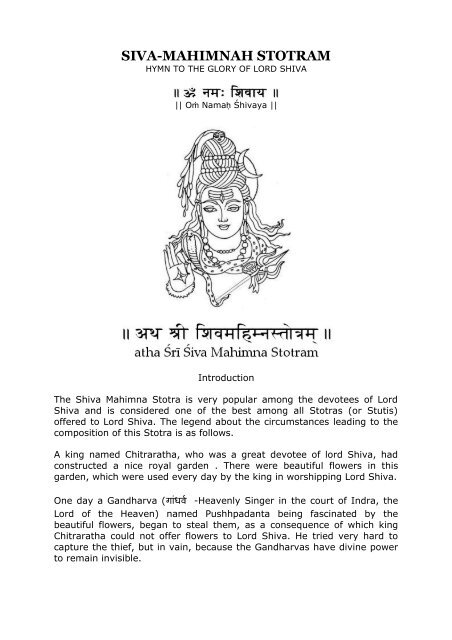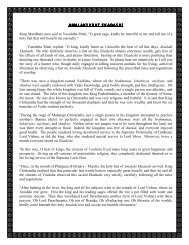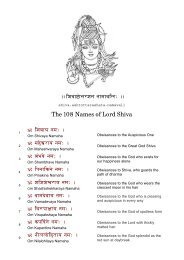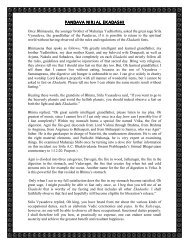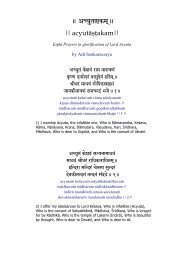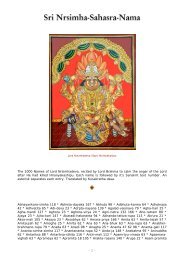SIVA-MAHIMNAH STOTRAM
SIVA-MAHIMNAH STOTRAM
SIVA-MAHIMNAH STOTRAM
You also want an ePaper? Increase the reach of your titles
YUMPU automatically turns print PDFs into web optimized ePapers that Google loves.
<strong>SIVA</strong>-<strong>MAHIMNAH</strong> <strong>STOTRAM</strong><br />
HYMN TO THE GLORY OF LORD SHIVA<br />
|| Oṁ Namaḥ Śhivaya ||<br />
Introduction<br />
The Shiva Mahimna Stotra is very popular among the devotees of Lord<br />
Shiva and is considered one of the best among all Stotras (or Stutis)<br />
offered to Lord Shiva. The legend about the circumstances leading to the<br />
composition of this Stotra is as follows.<br />
A king named Chitraratha, who was a great devotee of lord Shiva, had<br />
constructed a nice royal garden . There were beautiful flowers in this<br />
garden, which were used every day by the king in worshipping Lord Shiva.<br />
One day a Gandharva ( 坡 䴍 -Heavenly Singer in the court of Indra, the<br />
Lord of the Heaven) named Pushhpadanta being fascinated by the<br />
beautiful flowers, began to steal them, as a consequence of which king<br />
Chitraratha could not offer flowers to Lord Shiva. He tried very hard to<br />
capture the thief, but in vain, because the Gandharvas have divine power<br />
to remain invisible.
Finally the king spread the sacred Shiva Nirmaalya in his garden. Shiva<br />
Nirmaalya consists of the Bilva leaves, flowers, (⧮ il2), etc. which have<br />
been used in worshipping Lord Shiva . The Shiva Nirmaalya is considered<br />
holy.<br />
The thief Pushhpadanta, not knowing this, stepped on the sacred Shiva<br />
Nirmaalya, and by that he incurred the wrath of Lord Shiva and lost the<br />
divine power of invisibility. He then designed a prayer to Lord Shiva for<br />
forgiveness. In this prayer he sung the greatness of the Lord.<br />
This very prayer became well known as the 'Shiva Mahimna Stotra'. Lord<br />
Shiva became pleased by this Stotra, and returned Pushhpadanta's divine<br />
powers.<br />
The legend has some basis since the name of the author is mentioned in<br />
verse number 38 of the stotram. The recital of this stotra is very beneficial<br />
as proclaimed by one of its verses:<br />
"Anyone who recites this hymn with a pure heart and devotion will be<br />
blessed with fame ( 㣼 ኈ 䴍 ), wealth (न), long life (आय) and many children<br />
(सኈ) in this mortal world, and will attain Kailas, Shiva’s abode, after<br />
death." (Text 34)<br />
"Benefit of singing Shivmahimna stotra is far greater than either the<br />
benefit of spiritual initiation (i), charity (न), austerity (ኈl), pilgrimage<br />
(ኈ 䴍 ), knowledge of the scriptures (न), or the performance of ceremonial<br />
sacrifice (य-य).” (Text 36)<br />
Shivmahimna Stotra has 43 verses in Sanskrit. For the benefit of all<br />
beings this Stotra has been given with the original Devanagari Sanskrit,<br />
Roman transliteration and English verse translation.<br />
॥ अ ! 嗶 #न$ኈ 䘍 2 &॥<br />
‖ atha śrī śivamahimnastotram ‖<br />
Verse 1<br />
! 嗶 #न 垥 l( 坡 ኈ) l( *+, य-यस 嗶 <br />
$ኈኈ/ 䴍 0 iन *l ኈस1न$2य 3( 垥 4<br />
अ 㲥 6य 垥 स 䴍 垥 $ ኈl7( 83 98न &:<br />
mahimnaḥ pāraṁ te paramaviduṣo yadyasadṛśī<br />
stutirbrahmādīnāmapi tadavasannāstvayi giraḥ |<br />
athā'vācyaḥ sarvaḥ svamatiparimāṇāvadhi gṛṇan<br />
mamāpyeṣa stotre hara nirapavādaḥ parikaraḥ || 1 ||<br />
(Sri Pushpadanta said:)<br />
If it is unseemly to praise You when ignorant of the extent of' Your<br />
greatness, then even the praises of Brahma and others are inadequate. If<br />
no one can be blamed when they praise You according to their intellectual<br />
powers, then my attempt to compose a hymn cannot be reproached. (1)<br />
Verse 2<br />
अኈኈ 垥 l 坡 न 坡 ኈ च ! 嗶 ? नसय, 垥<br />
अኈ- 䴍 य922य य 坡 चAኈ B2ኈ) ኈ(*l4<br />
स $य $ኈ,ኈ 䴍 य 垥 ኈ*8 垥 $य *+य 垥<br />
l) 2 䴍 चन) lኈኈ न न 垥 $य न च 垥 ॥ २॥<br />
atītaḥ paṁthānaṁ tava ca mahimā vāṅmanasayoḥ<br />
atadvyāvṛttyā yaṁ cakitamabhidhatte śrutirapi |<br />
sa kasya stotavyaḥ katividhaguṇaḥ kasya viṣayaḥ<br />
pade tvarvācīne patati na manaḥ kasya na vacaḥ || 2 ||<br />
Your greatness is beyond the reach of mind and speech. Who can properly<br />
praise that which even the Vedas describe with trepidation, by means of'<br />
'neti-neti / not this, not this'? How many qualities does He possess? By<br />
whom can He be perceived? Yet whose mind and speech do not turn to<br />
the form later taken by Him (saguna) (2)<br />
Verse 3<br />
$D 㣼 ኈ च 垥 l(<br />
9ኈ 坡 न 䴍 ኈኈ 垥<br />
ኈ /0 न &: A 坡 *l स((,* 䴍 $ यl 4&:<br />
2)ኈ 坡 8 坡 8नlEय)न Bኈ 垥<br />
lन 2यF 㲥 G$ न &: l( न ⧮*H 䴍 य 䴍 सኈ॥ ३॥<br />
madhusphītā vācaḥ paramamṛtaṁ nirmitavataḥ<br />
tava brahman kiṁ vāgapi suragurorvismayapadam |<br />
mama tvetāṁ vāṇīṁ guṇakathanapuṇyena bhavataḥ<br />
punāmītyarthe'smin puramathana buddhirvyavasitā || 3 ||<br />
O Brahman! Do even Brihaspati's praises cause wonder to You, the author<br />
of the nectar like sweet Vedas? O destroyer of the three cities, the<br />
thought that by praising Your glories I shall purify my speech has<br />
prompted me to undertake this work. (3)
Verse 4<br />
ኈJK: K:यM य2ኈN 耀 य(P य9 ኈ &:<br />
2य$ኈ 䴍 य$ኈ 坡 ኈ 浥 + 8B1नस ኈन+4<br />
अB 䴍 यन G$ न &: ( ( 8य ( 8 坡<br />
* 嗶 1ኈ 坡 䴍 यR, 坡 *ኈ इ 嗶 J) 耀 ड3य 垥 ॥ ४॥<br />
tavaiśvaryaṁ yattajjagadudayarakṣāpralayakṛt<br />
trayīvastu vyastaṁ tisruṣu guṇabhinnāsu tanuṣu |<br />
abhavyānāmasmin varada ramaṇīyāmaramaṇīṁ<br />
vihantuṁ vyākrośīṁ vidadhata ihaike jaḍadhiyaḥ || 4 ||<br />
O Giver of boons! Some stupid people produce arguments--pleasing to the<br />
ignorant but in fact hateful-- to refute Your Divinity, which creates,<br />
preserves and destroys the world, which is divided into three bodies<br />
(Brahma, Vishnu and Shiva) according to the three gunas, and which is<br />
described in the three Vedas. (4)<br />
Verse 5<br />
A 嗶 垥 A 坡 य 垥 स ख A lयG$2Bन 坡<br />
A (, ኈ स9 耀 ኈ A lन इኈ च4<br />
अኈWयXKयF 2Yयनस( 垥 $, 嗶 ኈ3य 垥<br />
ኈ⚳ 㲥 य 坡 坡 GKचኈ &: ख(यኈ , 嗶 य 耀 ኈ 垥 ॥ ५॥<br />
kimīhaḥ kiṁkāyaḥ sa khalu kimupāyastribhuvanaṁ<br />
kimādhāro dhātā sṛjati kimupādāna iti ca |<br />
atarkyaiśvarye tvayyanavasara duḥstho hatadhiyaḥ<br />
kutarko'yaṁ kāṁścit mukharayati mohāya jagataḥ || 5 ||<br />
To fulfill what desire, assuming what form, with what instruments, support<br />
and material does that Creator create the three worlds? This kind of futile<br />
argumentation about You whose divine nature is beyond the reach of<br />
intellect, makes the perverted vociferous, and brings delusion to men. (5)<br />
Verse 6<br />
अ 耀 1 न, , 垥 A य1ኈ, 㲥 *l 耀 ኈ 坡<br />
अ3\]ኈ( 坡 A 坡 B*3(न 嗶 2य Bኈ4<br />
अन, य 䴍 -: Bन 耀 नन) 垥 l7((,<br />
यኈ, 1$2 坡 P2य (( स 坡 )(ኈ इ )॥ ६॥<br />
ajanmāno lokāḥ kimavayavavanto'pi jagatāṁ<br />
adhiṣṭhātāraṁ kiṁ bhavavidhiranādṛtya bhavati |
anīśo vā kuryād bhuvanajanane kaḥ parikaro<br />
yato mandāstvāṁ pratyamaravara saṁśerata ime || 6 ||<br />
O Lord of gods! Can the worlds be without origin, though they have<br />
bodies? Is their creation possible without a creator? Who else but God can<br />
initiate the creation of the worlds? Because they are fools they raise<br />
doubts about Your existence. (6)<br />
Verse 7<br />
2य स?_य 坡 य, 垥 llኈ ኈ 坡 J\8 ኈ<br />
PB1न) P$न) l( 垥 l`य ኈ च4<br />
रुचन 坡 J3चbय 嗶 耀 !c ननl 耀 + 坡<br />
न98 ), #य$2 स lयस 8 䴍 इ॥ ७॥<br />
trayī sāṅkhyaṁ yogaḥ paśupatimataṁ vaiṣṇavamiti<br />
prabhinne prasthāne paramidamadaḥ pathyamiti ca |<br />
rucīnāṁ vaicitryādṛjukuṭila nānāpathajuṣāṁ<br />
nṛṇāmeko gamyastvamasi payasāmarṇava iva || 7 ||<br />
Different paths (to realization) arc enjoined by the three Vedas, by<br />
Sankhya, Yoga, Pashupata (Shaiva) (doctrine and Vaishnava Shastras.<br />
People follow different paths, straight or crooked, according to their<br />
temperament, depending on which they consider best, or most<br />
appropriate--and reach You alone just as rivers enter the ocean. (7)<br />
Verse 8<br />
嗶 , 垥 खe? 坡 l((G 耀 न 坡 B$ Df8न 垥<br />
l 坡 च)ኈय2ኈ ( ኈ12,l(8 4&:<br />
स($ኈ 坡 ኈ 9*H 坡 ኈ ኈ BदhPf8! 嗶 ኈ 坡<br />
न ! 嗶 $2 ( 坡 *+य 9ኈ9\8 भ्र यኈ॥ ८॥<br />
mahokṣaḥ khaṭvāṅgaṁ paraśurajinaṁ bhasma phaṇinaḥ<br />
kapālaṁ cetīyattava varada tantropakaraṇam |<br />
surāstāṁ tāmṛddhiṁ dadhati tu bhavadbhūpraṇihitāṁ<br />
na hi svātmārāmaṁ viṣayamṛgatṛṣṇā bhramayati || 8 ||<br />
O Giver of boons! A great bull, a wooden hand rest, an axe, a tiger skin,<br />
ashes, serpents, a human skull and other such things--these are all You<br />
own, though simply by casting Your eyes on gods You gave them great<br />
treasures which they enjoy. Indeed one whose delight is in the Self cannot<br />
be deluded by the mirage of sense objects. (8)
Verse 9<br />
ध 坡 GKचኈ &: सM स l($2ध 坡<br />
l(, ध 捩 䴍 य 㲥 ध 捩 䴍 य) 耀 ኈ ኈ 䴍 य$ኈ*+य)4<br />
स $ኈ) 㲥
śiraḥpadmaśreṇī-racitacaraṇāmbhoruha-baleḥ<br />
sthirāyāstvadbhaktestripurahara visphūrjitamidam || 11 ||<br />
O Destroyer of Tripura, it was because of that great devotion, which<br />
prompted him to offer his heads as lotuses to Your feet, that the tenheaded<br />
Ravana was still with arms and eager for fresh war after he had<br />
effortlessly rid the three worlds of all traces of enemies. (11)<br />
Verse 12<br />
अ \य 22स)-स 3ኈस( 坡 B 耀 न 坡<br />
⧮ ኈ &: J स) 㲥 *l 23सኈ 捩 *R यኈ 垥 4<br />
अ 㰀 यlኈ ) 㲥
स u + 垥 E]) ኈ न रुኈ) न 3य 嗶 ,<br />
*(, 㲥 *l K vय, Bन-Bय- B?- 䴍 यसनन 垥 ॥ १४॥<br />
akāṇḍa-brahmāṇḍa-kṣayacakita-devāsurakṛpā<br />
vidheyasyā''sīd yastrinayana viṣaṁ saṁhṛtavataḥ |<br />
sa kalmāṣaḥ kaṇṭhe tava na kurute na śriyamaho<br />
vikāro'pi ślāghyo bhuvana-bhaya- bhaṅga- vyasaninaḥ || 14 ||<br />
O Three-Eyed One, who drank poison out of compassion for gods and<br />
demons when they were distraught at the sudden prospect of the<br />
destruction of the universe, surely the dark blue stain on Your throat has<br />
beautified You. Even deformity is to be admired in one who is given to<br />
freeing the world of fear. (14)<br />
Verse 15<br />
असH 䴍 नJ W3च*l स)स(न()<br />
नኈ 䴍 1ኈ) न2य 坡 耀 ኈ 耀 यन, य$य *ख 垥 4<br />
स lKय1न 2 ኈ(स(स(8 Bhኈ &:<br />
$ ( 垥 $ ኈ 䴍 य2 न ! 嗶 + l`य 垥 l7(B 垥 ॥ १५॥<br />
asiddhārthā naiva kvacidapi sadevāsuranare<br />
nivartante nityaṁ jagati jayino yasya viśikhāḥ |<br />
sa paśyannīśa tvāmitarasurasādhāraṇamabhūt<br />
smaraḥ smartavyātmā na hi vaśiṣu pathyaḥ paribhavaḥ || 15 ||<br />
O Lord, the god of love, whose arrows never fail in the world of gods and<br />
men, become nothing but an object of memory because he looked on You<br />
as an ordinary god (his body being burnt by Your look of wrath). An insult<br />
to the self-controlled is not conducive to good. (15)<br />
Verse 16<br />
嗶 i lwኈ-: व्र 耀 ኈ स 嗶 स स 坡 यl 坡<br />
l 坡 *\8,भ्र 䴍 #य-: B 耀 -l7(w-रुy8-ग्र 嗶 - 8 4&:<br />
嗶 - 䴍 य 捩 က$`य 坡 य2यनB9ኈ- 耀 c-ኈ|डኈ-ኈc<br />
耀 द्रयJ 2 坡 नcस नन J *Bኈ॥ १६॥<br />
mahī pādāghātād vrajati sahasā saṁśayapadaṁ<br />
padaṁ viṣṇorbhrāmyad bhuja-parigha-rugṇa-graha- gaṇam |<br />
muhurdyaurdausthyaṁ yātyanibhṛta-jaṭā-tāḍita-taṭā<br />
jagadrakṣāyai tvaṁ naṭasi nanu vāmaiva vibhutā || 16 ||<br />
When You danced to save the world, the earth was suddenly thrown into a<br />
precarious state at the striking of Your feet; the spatial regions and the<br />
hosts of stars felt oppressed by the movement of Your massive club-like
arms; and the heavens became miserable as their sides were constantly<br />
struck by Your waving matted hair. Indeed it is Your very mightiness<br />
which is the cause of the trouble. (16)<br />
Verse 17<br />
*य-- 䴍 य l ኈ(-8-f8ኈ-D)न,- -रु3च 垥<br />
P 嗶 , ( 坡 य 垥 l9+ኈ w 嗶 \c 垥 (स ኈ)4<br />
耀 ~l( 坡 耀 3 य 坡 ኈ)न 9 ኈ ኈ<br />
अन)नJ,1न)य 坡 9ኈ ! 嗶 ! 䴍 य 坡 ኈ l 垥 ॥ १७॥<br />
viya-dvyā pī tārā-gaṇa-guṇita-phenodgama-ruciḥ<br />
pravāho vārāṁ yaḥ pṛṣatalaghudṛṣṭaḥ śirasi te |<br />
jagaddvīpākāraṁ jaladhivalayaṁ tena kṛtamiti<br />
anenaivonneyaṁ dhṛtamahima divyaṁ tava vapuḥ || 17 ||<br />
The river which pervades the sky and whose foam crests look all the more<br />
beautiful because of stars and planets, seems no more than a drop of<br />
water when on Your head. That same river has turned the world into<br />
islands surrounded by waters. From this can be judged the vastness of<br />
Your divine body. (17)<br />
Verse 18<br />
( 垥 ,8 य1ኈ ኈ9ኈ()1द्र, न(,<br />
(?) च1द्रက (-च(8-lf8 垥 ( इኈ4<br />
!,$ኈ) , 㲥 य 坡 2l(ኈ98 ड#⧮( *3 垥<br />
*)यJ 垥 R 㣼 ड12य, न ख l(ኈ12 垥 PB3य 垥 ॥ १८॥<br />
rathaḥ kṣoṇī yantā śatadhṛtiragendro dhanuratho<br />
rathāṅge candrārkau ratha-caraṇa-pāṇiḥ śara iti |<br />
didhakṣoste ko'yaṁ tripuratṛṇamāḍambara vidhiḥ<br />
vidheyaiḥ krīḍantyo na khalu paratantrāḥ prabhudhiyaḥ || 18 ||<br />
When You wanted to burn the three cities of the demons - which were but<br />
a piece of straw to You--the earth was Your chariot, Brahma Your<br />
charioteer, the great mountain Meru Your bow, the sun and the moon the<br />
wheels of Your chariot, Vishnu Your arrow. Why all this paraphernalia? The<br />
Lord is not dependent on others. He was only playing with things at His<br />
command. (18)<br />
嗶 7($ኈ) स 嗶 浥 坡 <br />
Verse 19<br />
⧮ य lय, 垥<br />
य),न) ኈG$ न &: न 耀 嗶 (1न)2<br />
4&:
ኈ, BW2यद्र) 垥 l7(8ኈ स 捩 चRl+ 垥<br />
2य8 坡 (यJ 2l( 嗶 ( 耀 ኈ 䴍 耀 ኈ ॥ &: १९॥<br />
hariste sāhasraṁ kamala balimādhāya padayoḥ<br />
yadekone tasmin nijamudaharannetrakamalam |<br />
gato bhaktyudrekaḥ pariṇatimasau cakravapuṣaḥ<br />
trayāṇāṁ rakṣāyai tripurahara jāgarti jagatām || 19 ||<br />
O Destroyer of the three cities, Hari rooted out His own lotus-eye to make<br />
up the difference when one flower was missing in His offering of 1,000<br />
lotuses to Your feet. For this great devotion You awarded the discus<br />
(Sudarshan Chakra) ~ with which Hari protects the three worlds. (19)<br />
Verse 20<br />
Rኈ 捩 स
of sacrifices. Surely sacrifices cause injury to the sacrificers in the absence<br />
of faith and devotion. (21)<br />
Verse 22<br />
P 耀 न 坡 न PसB B 坡 $ 坡 ! 嗶 ኈ( 坡<br />
ኈ 坡 (,! 嗶 -: Bhኈ 坡 7(( य+ 9\य$य l+4<br />
न\l8)य 䴍 ኈ 坡 ! *l सl29 ኈ 坡<br />
2स1ኈ 坡 ኈ) 㲥 -य*l 2य 耀 ኈ न 9 䴍 य(Bस 垥 ॥ २२॥<br />
prajānāthaṁ nātha prasabhamabhikaṁ svāṁ duhitaraṁ<br />
gataṁ rohid bhūtāṁ riramayiṣumṛṣyasya vapuṣā |<br />
dhanuṣpāṇeryātaṁ divamapi sapatrākṛtamamuṁ<br />
trasantaṁ te'dyāpi tyajati na mṛgavyādharabhasaḥ || 22 ||<br />
O Lord, the fury of You who became a hunter with a bow in hand has not<br />
as yet left Brahma-who, overcome by incestuous lust and finding his own<br />
daughter transforming herself into a hind, desired to ravish her in the<br />
body of a stag-and keenly pierced by Your arrows, he (Brahma) has fled<br />
to the sky. (22)<br />
Verse 23<br />
$ Eय 坡 स 9ኈन+ 0नय ኈ98ኈ &:<br />
l( 垥 < \c 坡 嗶 \e l( न l\lय *l4<br />
य! $2J8 坡 ) य न(ኈ-) 嗶 䴍 -wcनኈ &:<br />
अJኈ 2 H ⧮ኈ ( y यኈय 垥 ॥ २३॥<br />
svalāvaṇyāśaṁsā dhṛtadhanuṣamahnāya tṛṇavat<br />
puraḥ pluṣṭaṁ dṛṣṭvā puramathana puṣpāyudhamapi |<br />
yadi straiṇaṁ devī yamanirata-dehārdha-ghaṭanāt<br />
avaiti tvāmaddhā bata varada mugdhā yuvatayaḥ || 23 ||<br />
O Destroyer of the three cities, O Giver of boons, is Parvati who saw the<br />
god of love, bow in hand, burnt like a piece of straw in a minute by You,<br />
still proud of her beauty and believing that You are fascinated by her,<br />
because she was allowed to occupy half Your body because of her<br />
austerities? Ah, surely all women are under delusion. You have completely<br />
conquered Your senses. (23)<br />
Verse 24<br />
K न)\R 㣼 ड $ ( 嗶 ( *lच 垥 स 嗶 च( 垥<br />
3चኈ-B$ )l 垥 浥 *l न9(,ci-l7(( 垥 4
अ ?uय 坡 坡 ኈ Bኈ न J fख 坡<br />
ኈ*l $ ኈÉ 䴍 8 坡 ( l( 坡 ? स॥ २४॥<br />
śmaśāneṣvākrīḍā smarahara piśācāḥ sahacarāḥ<br />
citā-bhasmālepaḥ sragapi nṛkaroṭī-parikaraḥ |<br />
amaṅgalyaṁ śīlaṁ tava bhavatu nāmaivamakhilaṁ<br />
tathāpi smartṝṇāṁ varada paramaṁ maṅgalamasi || 24 ||<br />
O Destroyer of the god of love, O Giver of boons, Your play is in cremation<br />
grounds, Your companions are ghosts, You smear Your body with the<br />
ashes of burnt bodies, human skulls are Your garland-all Your conduct is<br />
indeed inauspicious. But You promote the greatest good of those who<br />
remember You. (24)<br />
Verse 25<br />
न 垥 P2य&: 3च2ኈ) स* *य2ኈ- रुኈ 垥<br />
Pt\यद्र, 8 垥 P -स ,2स?ኈ- 嗶 垥 4<br />
य ,Wय0 坡 m इ न Nय 9ኈ य)<br />
2य1ኈ$ኈ22 坡 A *l य न$ኈኈ &: A Bन ॥ &: २५॥<br />
manaḥ pratyak citte savidhamavidhāyātta-marutaḥ<br />
prahṛṣyadromāṇaḥ pramada-salilotsaṅgati-dṛśaḥ |<br />
yadālokyāhlādaṁ hrada iva nimajyāmṛtamaye<br />
dadhatyantastattvaṁ kimapi yaminastat kila bhavān || 25 ||<br />
You are indeed that inexpressible Truth which the yogis realize within<br />
through concentrating their minds on the Self and controlling the breath<br />
according to the directions laid down in the scriptures, and realizing which<br />
Truth they experience rapturous thrills and shed profuse tears of joy;<br />
swimming as it were in a pool of nectar they enjoy inner bliss. (25)<br />
Verse 26<br />
2 䴍 $2 坡 स, $2 स lन$2 坡 嗶 ኈ 嗶 垥<br />
2 l$2 坡 䴍 य, 2 (f8(2 2 ኈ च4<br />
l7(G6 剨 1न ) 坡 2य l7(8ኈ ⧮भ्रኈ 3( 坡<br />
न *ሀࣰ$ኈ2ኈ22 坡 य 嗶 ኈ यኈ &: 2 坡 न Bसस॥ २६॥<br />
tvamarkastvaṁ somastvamasi pavanastvaṁ hutavahaḥ<br />
tvamāpastvaṁ vyoma tvamu dharaṇirātmā tvamiti ca |<br />
paricchinnāmevaṁ tvayi pariṇatā bibhrati giraṁ<br />
na vidmastattattvaṁ vayamiha tu yat tvaṁ na bhavasi || 26 ||<br />
The wise hold this limiting view of You: You are the sun, You are the<br />
moon, You are fire, You are air, You are water, You are space, You are the
earth and You are the Self. But we do not know the things which You are<br />
not. (26)<br />
Verse 27<br />
2य 坡 ኈ 浥 , 92ኈG$2Bन , 2न*l स(न &:<br />
अ(-यJ 䴍 8XG$2B(Bኈ &: ኈ8 䴍 *9 ኈ4<br />
ኈ(iय 坡 ኈ) नB(रु1न 8B 垥<br />
स $ኈ- 䴍 य$ኈ 坡 2 坡 (8 982य, ኈ l ॥ &: २७॥<br />
trayīṁ tisro vṛttīstribhuvanamatho trīnapi surān<br />
akārādyairvarṇaistribhirabhidadhat tīrṇavikṛti |<br />
turīyaṁ te dhāma dhvanibhiravarundhānamaṇubhiḥ<br />
samasta-vyastaṁ tvāṁ śaraṇada gṛṇātyomiti padam || 27 ||<br />
O Giver of refuge, with the three letters A, U, M, indicating the three<br />
Vedas, three states, three worlds and the three gods, the word AUM(Om)<br />
describes You separately. By its subtle sound the word Om collectively<br />
denotes You - Your absolute transcendental state which is free from<br />
change. (27)<br />
Verse 28<br />
B 垥 ⚳ रुद्र 垥 llኈ(,ग्र 垥 स 嗶 嗶 न &:<br />
ኈ B )न*ኈ यBन\c 4&:<br />
अ G\ न &: P2य) 坡 P*च(ኈ ) ኈ(*l<br />
*Pयय$ J#न) Pf8! 嗶 ኈ-न $य, 㲥 G$ Bኈ)॥ २८॥<br />
bhavaḥ śarvo rudraḥ paśupatirathograḥ sahamahān<br />
tathā bhīmeśānāviti yadabhidhānāṣṭakamidam |<br />
amuṣmin pratyekaṁ pravicarati deva śrutirapi<br />
priyāyāsmaidhāmne praṇihita-namasyo'smi bhavate || 28 ||<br />
O Lord! Bhava, Sharva, Rudra, Pashupati, Ugra, Mahadeva, Bhima, and<br />
Ishana-these eight names of Yours are each treated in detail in the Vedas.<br />
To You, most beloved Lord Shankara, of resplendent form, I offer<br />
salutations. (28)<br />
Verse 29<br />
न , न)!\]य *Pय *\]य च न 垥<br />
न 垥 ,!\]य $ ( 嗶 ( ! 嗶 \]य च न 垥 4<br />
न , *+ 䴍 \]य 2नयन य*\]य च न 垥<br />
न 垥 स 䴍 $ J ኈ) ኈ! ኈस 䴍 य च न 垥 ॥ २९॥
namo nediṣṭhāya priyadava daviṣṭhāya ca namaḥ<br />
namaḥ kṣodiṣṭhāya smarahara mahiṣṭhāya ca namaḥ |<br />
namo varṣiṣṭhāya trinayana yaviṣṭhāya ca namaḥ<br />
namaḥ sarvasmai te tadidamatisarvāya ca namaḥ || 29 ||<br />
O Lover of solitude, my salutations to You who are the nearest and the<br />
farthest. O Destroyer of the god of love, my salutations to You who are<br />
the minutest and also the largest. O Three-eyed one, my salutations to<br />
You who are the oldest and also the youngest. My salutations to You again<br />
and again who are all and also transcending all. (29)<br />
Verse 30<br />
⧮ 嗶 -( 耀 स) *K,2l2ኈ 捩 Bय न , न 垥<br />
P⧮ -ኈ स) ኈኈ &: स 坡 嗶 () 嗶 (य न , न 垥 4<br />
耀 न-सख9 ኈ) स22,!द्रWኈ 捩<br />
9डय न , न 垥<br />
P 嗶 स l) न$2JEय) य न , न 垥 ॥ ३०॥<br />
bahula-rajase viśvotpattau bhavāya namo namaḥ<br />
prabala-tamase tat saṁhāre harāya namo namaḥ |<br />
jana-sukhakṛte sattvodriktau mṛḍāya namo namaḥ<br />
pramahasi pade nistraiguṇye śivāya namo namaḥ || 30 ||<br />
Salutations to You as Brahma in whom rajas prevails for the creation of<br />
the universe. Salutations to You as Rudra in whom tamas prevails for its<br />
destruction. Salutations to You as Vishnu in whom sattva prevails for<br />
giving happiness to the people. Salutations to You, O Shiva, who are<br />
effulgent and beyond the three attributes. (30)<br />
Verse 31<br />
9 -l7(8ኈ-च)ኈ 垥 W )Kय 坡 W च) 坡<br />
W च ኈ 8-स ,u ?wन K 嗶 *H 垥 4<br />
इኈ चAኈ 1i9 2य 坡 BGWኈ(-:<br />
( च(8य,$ኈ) Wय-l\l,l 嗶 ( ॥ &: ३१॥<br />
kṛśa-pariṇati-cetaḥ kleśavaśyaṁ kva cedaṁ<br />
kva ca tava guṇa-sīmollaṅghinī śaśvadṛddhiḥ |<br />
iti cakitamamandīkṛtya māṁ bhaktirādhād<br />
varada caraṇayoste vākya-puṣpopahāram || 31 ||<br />
O Giver of boons, how poor is my ill-developed mind, subject to afflictions,<br />
and how boundless Your divinity- Eternal and possessing infinite virtues.<br />
Though terror--stricken because of this, I am inspired by my devotion to<br />
offer this hymnal garland at Your feet. (31)
Verse 32<br />
असኈ-37(-स 坡 $यኈ &: N 耀 坡 स1-l2)<br />
स(-ኈरु(-ख )खन l2 Ȁ4<br />
खኈ य! 9 嗶 i2 ( स 䴍 坡<br />
ኈ*l ኈ 8न l( 坡 न यኈ॥ ३२॥<br />
asita-giri-samaṁ syāt kajjalaṁ sindhu-pātre<br />
sura-taruvara-śākhā lekhanī patramurvī |<br />
likhati yadi gṛhītvā śāradā sarvakālaṁ<br />
tadapi tava guṇānāmīśa pāraṁ na yāti || 32 ||<br />
O Lord, if the black mountain be ink, the ocean the inkpot, the branch of<br />
the stout wish-fulfilling tree a pen, the earth the writing leaf, and if taking<br />
these the Goddess of Learning writes for eternity, even then the limit of<br />
Your virtues will not be reached. (32)<br />
Verse 33<br />
अस(-स(- न1द्रJ(3च 䴍 ኈ$य)1- 捩 ) 垥<br />
ग्र3ኈ-8 ! 嗶 #न, न 䴍 8$य)K($य4<br />
स -8-7(\] 垥 l\l1ኈBन 垥<br />
रु3च( w92ኈJ 垥 $ኈ,2 )ኈ6च(॥ ३३॥<br />
asura-sura-munīndrairarcitasyendu-mauleḥ<br />
grathita-guṇamahimno nirguṇasyeśvarasya |<br />
sakala-gaṇa-variṣṭhaḥ puṣpadantābhidhānaḥ<br />
ruciramalaghuvṛttaiḥ stotrametaccakāra || 33 ||<br />
The best of Gandharvas, Pushpadanta by name, composed in great<br />
devotion this beautiful hymn to the Lord, who is worshipped by demons,<br />
gods, and the best of sages, whose praises have been sung, who has the<br />
moon on His forehead, and who is attributeless. (33)<br />
Verse 34<br />
अ 嗶 ( 嗶 (न-य 坡 h 耀 䴍 c) 垥 $ኈ,2 )ኈኈ &:<br />
l]ኈ l( BW2य H-3च2ኈ 垥 l न &: य 垥 4<br />
स Bኈ ,) रुद्रኈuय$ኈ 㲥 2<br />
Pच(ኈ(-नय 垥 l2न &: 㣼 ኈ 䴍 坡 Kच॥ ३४॥<br />
aharaharanavadyaṁ dhūrjaṭeḥ stotrametat<br />
paṭhati paramabhaktyā śuddha-cittaḥ pumān yaḥ |<br />
sa bhavati śivaloke rudratulyastathā'tra<br />
pracuratara-dhanāyuḥ putravān kīrtimāṁśca || 34 ||
The person who with purified heart and in great devotion always reads<br />
this beautiful and elevating hymn to Shiva, becomes like Shiva (after<br />
death) in the abode of Shiva, and while in this world gets abundant<br />
wealth, long life, progeny and fame. (34)<br />
Verse 35<br />
嗶 )1नl(, ), ! 嗶 #न, नl( $ኈኈ 垥 4<br />
अw,(1नl(, 12, नG$ኈ ኈ22 坡 (, 垥 l( ॥ &: ३५॥<br />
maheśānnāparo devo mahimno nāparā stutiḥ |<br />
aghorānnāparo mantro nāsti tattvaṁ guroḥ param || 35 ||<br />
There is no God higher than Shiva, there is no hymn better than the hymn<br />
on the greatness of Shiva, there is no mantra more powerful than the<br />
name of Shiva, there is nothing higher to be known than the real nature of<br />
the Guru. (35)<br />
Verse 36<br />
i न 坡 ኈl$ኈM न 坡 य! 垥 ARय 垥 4<br />
! 嗶 #न$ኈ l]$य 坡 न 嗶 䴍 G1ኈ +,ड ॥ &: ३६॥<br />
dīkṣā dānaṁ tapastīrthaṁ jñānaṁ yāgādikāḥ kriyāḥ |<br />
mahimnastava pāṭhasya kalāṁ nārhanti ṣoḍaśīm || 36 ||<br />
Initiation into spiritual life, charities, austerities, pilgrimages, practice of<br />
yoga, performance of sacrificial rites - none of these give even a sixteenth<br />
part of the merit that one gets by reciting the hymn on the greatness of<br />
Shiva. (36)<br />
Verse 37<br />
स न-न स 䴍 -1 䴍 -( 耀 垥<br />
((- 捩 )F)$य स 垥 4<br />
स ख न 耀 - ! 嗶 #न, भ्र\c ए$य (,+ኈ &:<br />
$ኈन +Ȁ-: ! 䴍 य-! 䴍 य 坡 ! 嗶 #न 垥 ॥ ३७॥<br />
kusumadaśana-nāmā sarva-gandharva-rājaḥ<br />
śaśidharavara-maulerdevadevasya dāsaḥ |<br />
sa khalu nija-mahimno bhraṣṭa evāsya roṣāt<br />
stavanamidamakārṣīd divya-divyaṁ mahimnaḥ || 37 ||<br />
The Lord of Gandharvas, Pushpadanta by name, is the servant of the God<br />
of gods who has the crescent moon on his forehead. Fallen from his glory
due to the wrath of the Lord, he composed this very beautiful uplifting<br />
hymn on the greatness of Shiva to regain His favor. (37)<br />
Verse 38<br />
स(रु BlhNय $ 䴍 - ,J- 嗶 )ኈ 坡<br />
l]ኈ य! न\य 垥 P 券 耀 न 䴍 1य-च)ኈ 垥 4<br />
व्र 耀 ኈ -स l 坡 A1न(J 垥 $ኈhय न 垥<br />
$ኈन ,w 坡 l\l1ኈP8ኈ ॥ &: ३८॥<br />
suragurumabhipūjya svarga-mokṣaika-hetuṁ<br />
paṭhati yadi manuṣyaḥ prāñjalirnānya-cetāḥ |<br />
vrajati śiva-samīpaṁ kinnaraiḥ stūyamānaḥ<br />
stavanamidamamoghaṁ puṣpadantapraṇītam || 38 ||<br />
If one with single-minded devotion and folded palms reads this unfailing<br />
hymn composed by Pushpadanta, which is adored by great gods and the<br />
best of sages and which grants heaven and liberation, one goes to Shiva<br />
and is worshipped by Kinnaras (celestial beings). (38)<br />
Verse 39<br />
आस
tava tattvaṁ na jānāmi kīdṛśo'si maheśvara |<br />
yādṛśo'si mahādeva tādṛśāya namo namaḥ || 41 ||<br />
I do not know the truth of your nature and who you are- O great God my<br />
salutations to your true nature. (41)<br />
Verse 42<br />
ए 坡 -* 坡 2 坡 य 垥 l])1न( 垥 4<br />
स 䴍 ll-*न 䴍 Wኈ 垥 ,) 嗶 iयኈ)॥ ४२॥<br />
ekakālaṁ dvikālaṁ vā trikālaṁ yaḥ paṭhennaraḥ |<br />
sarvapāpa-vinirmuktaḥ śiva loke mahīyate || 42 ||<br />
Whoever reads this once, twice or thrice (in a day) revels in the domain of<br />
Shiva, bereft of all sins. (42)<br />
Verse 43<br />
l\l1ኈ- ख-l? 耀 -न 䴍 ኈ)न<br />
$ኈ,2)8 AGu⧮+- 嗶 ()8 嗶 (-*Pय)84<br />
E]G$ኈ)न l!]ኈ)न स ! 嗶 ኈ)न<br />
सPf8ኈ, Bኈ Bhኈlኈ 䴍 嗶 ) 垥 ॥ ४३॥<br />
śrī puṣpadanta-mukha-paṅkaja-nirgatena<br />
stotreṇa kilbiṣa-hareṇa hara-priyeṇa |<br />
kaṇṭhasthitena paṭhitena samāhitena<br />
suprīṇito bhavati bhūtapatirmaheśaḥ || 43 ||<br />
If a person learns by heart and recites this hymn, which flowed from the<br />
lotus mouth of Pushpadanta, which destroys sins and is dear to Shiva and<br />
which equally promotes the good of all, Shiva, the Lord of creation,<br />
becomes very pleased. (43)<br />
॥ इኈ l\l1ኈ *(3चኈ 坡 ! 嗶 #न 垥 $ኈ,2 坡 स


